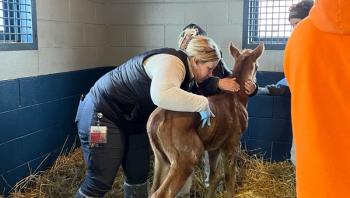
AVMA reaffirms veterinary hospice-care guidelines
Denver, Colo. - The American Veterinary Medical Association's (AVMA) Executive Board reaffirmed "Guidelines for veterinary hospice care" after a committee advised that the guidelines continue to be referenced and used.
DENVER, COLO. — The American Veterinary Medical Association's (AVMA) Executive Board reaffirmed "Guidelines for veterinary hospice care" after a committee advised that the guidelines continue to be referenced and used.
Originally approved by the board in April 2001, the guidelines were evaluated as part of a five-year policy review at the suggestion of AVMA's Committee on the Human-Animal Bond.
People comfortable with the concept of hospice for terminally ill persons are increasingly requesting similar services from their veterinarians for their companion animals, because it gives clients time to make decisions and prepare for the pending death of an animal.
Because hospice is time-consuming and requires a significant commitment to the patient's medical needs, AVMA identifies the following key issues that should be addressed when hospice is provided:
- Family dynamics should be considered when deciding whether veterinary hospice care is appropriate.
Veterinarians should counsel clients regarding the severity of the animal's illness, the expected outcome and spell out the responsibilities for the owner and veterinarian.
- Fees should be discussed and agreed upon before hospice service is provided.
- Patients should be kept as free from pain as possible and in a sanitary state.
- The veterinary practice must have an appropriate Drug Enforcement Administration and state license, and keep records of all drugs and supplies dispensed.
- Clients should be advised, preferably before the animal dies, of their options concerning care of the animal's remains.
- Veterinary care should be available at all times. This includes after-hours referral for emergency care or advice.
- A team approach, encompassing professionals in veterinary medicine and psycho-social care is the ideal.
The veterinary hospice team should be prepared to recommend that clients contact licensed mental-health professionals who are trained and experienced in grief and bereavement.
Newsletter
From exam room tips to practice management insights, get trusted veterinary news delivered straight to your inbox—subscribe to dvm360.




